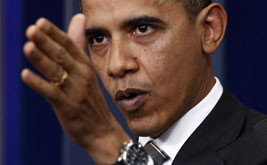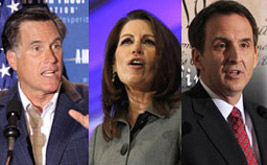
The Breakdown: Is the Federal Deficit Actually Bad for Our Economy? The Breakdown: Is the Federal Deficit Actually Bad for Our Economy?
Would getting rid of the federal deficit be the silver bullet for our ailing economy? Robert Pollin explains why the standard arguments against deficit spending don't tell the whol...
Jul 22, 2011 / Chris Hayes

The Breakdown: Can Any Candidate Keep the GOP Together? The Breakdown: Can Any Candidate Keep the GOP Together?
Can the fractious elements of the Republican party—from tea party fanatics to fiscal hawks and the religious right—come together behind a single candidate?
Jun 17, 2011 / Chris Hayes

The Breakdown: Is Syria on the Brink of Revolution? The Breakdown: Is Syria on the Brink of Revolution?
Political analyst Joshua M. Landis explains why the Syrian president's recent concessions are too little too late for a burgeoning protest movement that's interested in more than p...
Jun 10, 2011 / Chris Hayes

The Breakdown: How Does US Campaign Finance Stack Up Against the Rest of the World? The Breakdown: How Does US Campaign Finance Stack Up Against the Rest of the World?
Are other countries as vulnerable to the effects of money and private interests in politics as we are in the United States?
Jun 3, 2011 / Chris Hayes

The Breakdown: Can the Government Protect Boeing’s Workers? The Breakdown: Can the Government Protect Boeing’s Workers?
Boeing's workers allege that the company unfairly retaliated against them for exercising their statutory right to go on strike and collectively bargain—what can the National Labor ...
May 27, 2011 / Chris Hayes

The Breakdown: Are Political Advocacy Donors Evading Taxes? The Breakdown: Are Political Advocacy Donors Evading Taxes?
The IRS is investigating whether five wealthy donors financing political advocacy groups should be paying additional taxes on their contributions. What is this tax, and why hasn't ...
May 19, 2011 / Chris Hayes

The Breakdown: What Will the ‘War on Terror’ Look Like After Osama bin Laden? The Breakdown: What Will the ‘War on Terror’ Look Like After Osama bin Laden?
In the wake of the killing of Osama bin Laden, will the US alter its strategy in the 'War on Terror'? Jeremy Scahill joins Chris Hayes to explain how the death of the Al Qaeda lead...
May 6, 2011 / Chris Hayes

The Breakdown: Is Syria on the Brink of Revolution? The Breakdown: Is Syria on the Brink of Revolution?
Political analyst Joshua M. Landis explains why the Syrian president's recent concessions are too little too late for a burgeoning protest movement that's interested in more than p...
Apr 29, 2011 / Chris Hayes

The Breakdown: Are Financial Institutions Holding Our Economy Hostage? The Breakdown: Are Financial Institutions Holding Our Economy Hostage?
Years after we were first told that the banks were "too big to fail," we still seem to be held captive by the same financial system that caused our economic mess in the first place...
Apr 22, 2011 / Chris Hayes

The Breakdown: How Does US Campaign Finance Stack Up Against the Rest of the World? The Breakdown: How Does US Campaign Finance Stack Up Against the Rest of the World?
Are other countries as vulnerable to the effects of money and private interests in politics as we are in the United States?
Apr 15, 2011 / Chris Hayes
